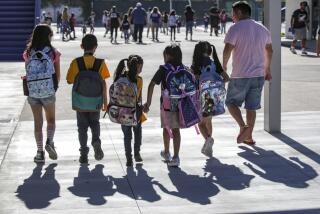Schools Advised to Assess AIDS Threat Before Admittance
SACRAMENTO — While acknowledging that the risk of children contracting the AIDS virus in schools is “essentially non-existent,” state Health Director Kenneth W. Kizer on Friday refused to rule out the possibility and cautioned school officials to make a “case-by-case” decision on whether to admit children with the disease.
In a two-page report to schools Supt. Bill Honig, Kizer said state health officials are convinced that AIDS cannot be transmitted by casual contact. But at a hastily called press conference, Kizer said whether to admit children with AIDS to schools should be determined by individual school boards.
“Even though there is overwhelming consensus among public health authorities that the risk of transmission via casual person-to-person contact . . . is essentially non-existent, the risk at this time is not quantifiable and we cannot say unequivocally that the risk is zero,” Kizer said in his report.
Risk Too Great
Kizer said the risk must be weighed in light of the fact that acquired immune deficiency syndrome “has been found to be incurable and invariably fatal.”
Accordingly, he said, “The question becomes an educational question and a social question and that is best determined at the political level.”
Kizer’s advice was expected to be the basis for an official policy statement on AIDS children that Honig intends to issue to all public schools later this month. The policy also is expected to include precautions teachers and school nurses should take when working with AIDS children.
Honig agrees with Kizer’s basic case-by-case stance, but said in an interview that he does not believe that Kizer’s advice goes far enough in offering guidelines to schools on how they should make decisions. Until he can get further clarification, Honig said, school districts ought to “exercise caution” when deciding whether or not to admit children with AIDS.
“We have to weigh the rights of the child against the rights of the community,” Honig said. “From what I gather so far (AIDS) cannot be transmitted by casual contact, but we really don’t know all the answers. Until then, we ought to be cautious.”
Specifically, Honig said, Kizer’s report did not say how school officials will be able to determine which AIDS children have a higher risk of transmitting the disease and what precautions teachers and other students ought to be taking.
The approaches of both Honig and Kizer are somewhat more cautious than that taken by the national Centers for Disease Control, which contends that children with AIDS pose no risk to other students.
Sex Contact, Drugs
Medical experts generally agree that AIDS is spread through sexual contact--mainly among homosexuals--and by intravenous drug users, and not through casual contact such as what might be expected on school grounds. But the issue has touched off an emotional reaction among some parents, most notably in New York, where a special panel’s decision to admit a second-grader with AIDS brought a classroom boycott.
Nationally, officials estimate that there are fewer than 200 children under 13 who have been diagnosed as having AIDS. Kizer said in California there are only five known AIDS cases among school children, but declined to say where those children live.
In Los Angeles County, eight children have been diagnosed as having AIDS since 1981, but school officials say none of them are attending school in the Los Angeles area.
Honig said that Kizer’s advice to make a case-by-case determination on AIDS children is meaningless, since the Department of Health Services does not help school districts identify which children have the disease. Moreover, he said, the risks might be higher in junior high and high schools, in which students are more likely to engage in sexual activities.
“We need to give advice to the schools on how to make the determination (of who has AIDS),” Honig said. “They’re on the hook right now. They have to make a decision, but they don’t have the facts to make it.”
Kizer insisted that the Department of Health Services is in no position to help schools identify AIDS children because of confidentiality laws and because “we don’t have the information either.”
More to Read
Sign up for Essential California
The most important California stories and recommendations in your inbox every morning.
You may occasionally receive promotional content from the Los Angeles Times.










